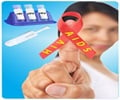The Ebola disease is a grueling test for even the most experienced humanitarian as an invisible, murderous enemy that puts caregivers in almost unbearable working conditions.

"In a conflict, you avoid areas where there is risk, landmines... Here the enemy is everywhere," says the German paediatrician, who runs an Ebola treatment unit in Kenema district.
"Usually medicine is your best protection because if you work well, no one will attack you. With Ebola, you yourself are a target."
The virus has infected hundreds of local healthcare workers in west Africa, and has not spared their colleagues from more developed countries either.
A doctor from the Cuban contingent in Sierra Leone was evacuated Thursday to Geneva and a Spanish Doctors Without Borders volunteer in Mali was repatriated as a precaution on Friday.
On Monday a Sierra Leonean doctor who was evacuated to the United States, died of the virus.
Advertisement
"We have experience, we've lived through wars, earthquakes, tsunamis, floods... In a catastrophe, after a few days you have fewer and fewer new patients. Here, they increase," he says.
Advertisement
The working conditions are exhausting for his team, who toil head to toe in rubber biohazard suits, plexiglass masks protecting their face and eyes in temperatures of more than 35C (95F).
Scottish nurse Margie Lee and her colleague Liz, from New Zealand, finish a round of the patients, having just given a pale toddler a blood transfusion.
Exhausted, the women pass together through a chlorinated shower to the undressing area, the most dangerous part of the process where they must peel off their suits without touching the outside.
Despite the exhaustion, they proceed meticulously, not letting their concentration drop.
Liz looks up, while Margie closes her eyes. Each item is methodically removed under the orders of a "dresser" who directs the procedure.
- No handshakes, no kisses -
It takes 15 to 20 minutes for the nurses to remove everything, revealing blouses drenched in sweat.
"Without the dresser, even after three weeks we would end up missing a step," says Margie.
"We do two to three rounds per day, of one hour at most. Always in a pair and with a watch on the sleeve to check the time. We have to move slowly.
"Sweat forms a cloud on the mask, it runs down the inside... It's difficult to put in a drip, especially with gloves on. We know we have no room for error."
The heat and the intense concentration take their toll on the mind as well as the body, she says, describing the work as "emotionally exhausting".
Patients can die suddenly, the latest example is an 18-month-old baby who had arrived two weeks ago with its mother, who has also died.
"The infant seemed to be doing well. But that's Ebola.", says Margie.
"You are talking to someone who seems good and an hour later, he's dead." she tells AFP, voice faltering.
"The children... they die alone, suddenly, no one at their side. The others are afraid of them so they don't come near."
And when the young patients do get to see the nurse, she is hidden behind her mask.
"But they do not seem disturbed by our appearance, they accept it," Margie says.
For centre manager Ranveig Tveitnes, there is no let-up. Even in the evenings, the team get together to talk about the day's cases.
"The strange thing about this situation is that here, your safety comes first, then public health and only then the patient. It is difficult for caregivers." he says.
Healthcare workers are on assignment for four to five weeks -- a month or more with no physical contact, no handshakes, no kisses, no helping hands.
Recently a British medic who had become a friend of Gardemann left the centre.
"We both put on protective suits to be able to give each other a big hug," he says.
Source-AFP










